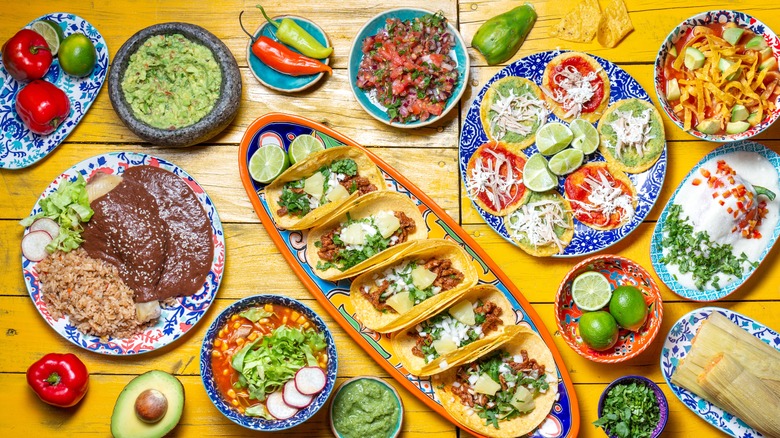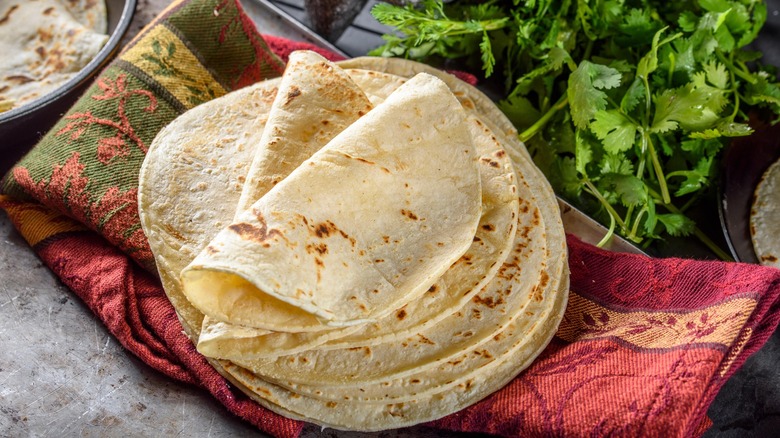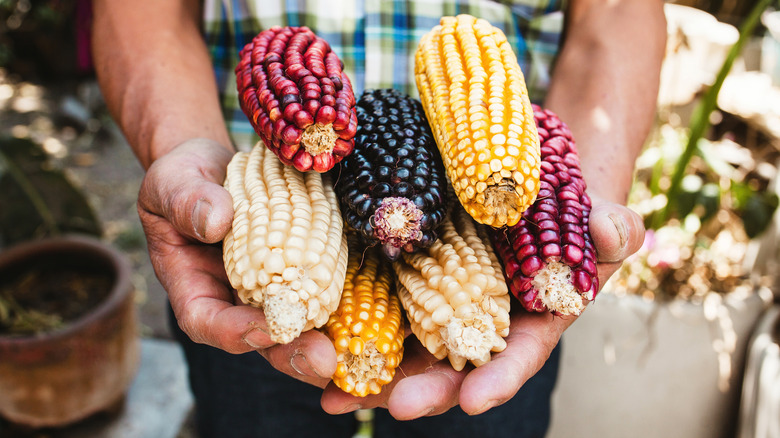The Tortilla Red Flag To Watch Out For At A Mexican Restaurant
When deciding where to eat, there are usually several signs that indicate a bad restaurant that is worth avoiding. Of course, a low health department rating and worse reviews are glaring red flags. However, the menu itself often has some subtle clues that you should find somewhere else to grab a bite. For instance, if you can order sushi and a burger at the same spot, the kitchen may be trying to tackle too many types of cuisine to execute them well. But even restaurants that serve only one specific fare have unspoken standards of what should and shouldn't be on the menu. In terms of Mexican food, specifically, one such expectation has to do with tortillas.
It's certainly hard to beat a good Mexican restaurant. But depending on where you live, it can take a while to find one. Whether you judge based on how crispy and cheesy the chiles rellenos are or the array of fresh salsas, tortillas clearly indicate a Mexican eatery's quality. People who are particular about tortillas might pay attention to their texture or flavor. Similarly, serious burrito fanatics might form an unwavering opinion based on whether or not a flour tortilla is warmed before being folded. (It absolutely should be.) However, the biggest tortilla red flag to watch out for has to do with which ones are available — or, rather, which ones aren't. If the Mexican restaurant you're considering doesn't serve corn tortillas (in any color), you're best off finding another place to eat.
No corn tortillas? Not a good sign
Authentic or not, any Mexican restaurant that serves tasty food likely serves corn tortillas with it. The thin flat bread is the foundation of the cuisine, often literally, as it's the vehicle for most delicious Mexican dishes and, at the very least, almost always appears on the table in the form of chips and salsa. Whether dipped in sauces and folded around tender, juicy meat or fried into a crispy vehicle for toppings, corn tortillas are used for everything from tacos al pastor to tostadas. In fact, corn is as traditional an ingredient as beans, tomatoes, or chili peppers, and has been part of the region's cuisine for millennia. Naturally, a Mexican eatery that doesn't have corn tortillas on the menu is unlikely to satisfy your cravings.
However, that's not to say that the flour tortillas folded into burritos and quesadillas aren't authentic or popular, especially in the northern part of the country. After the Spanish brought wheat crops to the region in the 16th century, states close to the border like Sonora — where the tortillas might span the length of your arm — began making wheat flour tortillas, as explained by historian Gustavo Arellano. By consequence, it's not abnormal for waiters at Mexican restaurants in the U.S. to ask if you'd prefer corn or flour tortillas with your meal; having the option is what's important. After all, corn still reigns supreme in most of Mexico, so it rightly belongs on menus.
A brief history of corn in Mexico
The historical roots of corn long precede Mexico achieving independence from Spain in 1821. While it's one of the most commonly grown crops on the planet today, indigenous Mesoamericans domesticated maize approximately 9,000 years ago in southwestern Mexico. During Maya and Aztec rule, the crop was considered sacred and woven throughout religious myths and rituals of both cultures. In fact, tamales, which date back to these ancient times, were standardly regarded as a food of the gods. And while corn tortillas may not be quite as old as the tamale, they're still made from the same stuff.
Masa harina is the final product of another Mesoamerican achievement: nixtamalization. The process involves boiling and soaking corn kernels in water and slaked lime (calcium hydroxide), removing the hulls, and grinding the corn into a dry flour. To make corn tortillas, masa is turned into dough, then pressed and cooked.
Corn is still celebrated and treasured today in its many forms, if not daily through ordinary meal-time reverence then especially on Mexico's National Corn Day on September 29. There's even a saying that pays respect to the crop's significance and serves as the namesake of a national campaign for food sovereignty: "Sin maíz no hay país" or "Without corn, there is no country." Considering corn's place in Mexico's cultural and culinary history, it's clear that any Mexican restaurant worth its salt should have corn tortillas.


